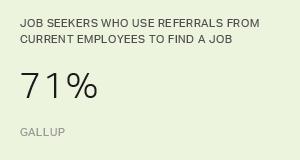Succession Planning
Explore Gallup's research.

Most employer-business owners who are nearing retirement plan to sell or transfer their company, contrasting with nonemployers.

A hiring freeze can be an opportunity to evaluate and refine current hiring processes to improve the candidate experience.

Learn why taking over a family business requires a leadership development framework specific to the emotional dynamics and challenges involved.

Learn the most important things to do to retain a good relationship with employees who leave your organization.

Learn about the business case for fair hiring assessments and why even the best managers have hiring biases.

Learn why cognitive bias is hurting your promotion and succession decisions and how to create a plan that relies on data, not perception.

Learn how to create an exit interview that reveals why your best people are leaving and how you can use the data to keep your other star employees.

Learn four practical steps for turning succession planning from an imprecise art into an exact science.
When employees leave a company, many often take valuable attributes like knowledge and experience with them. But departing employees might also walk off with something more intangible: a piece of the company's established corporate culture.
35% of U.S. Managers Are Engaged in Their Jobs
Here's the best way to let emerging leaders know about their potential -- and your plans to develop it -- without alienating their colleagues. The key: Use objective and public criteria.
Just naming the new CEO isn't an effective plan. That's replacement planning. In this conversation, a Gallup executive tells how to create a succession plan that makes your company stronger.
Companies that lead the world in growth have a relentless focus on talent. They're run by executives who have created high-performing operating systems that name the right people as managers and leaders.
Unemployment continues to rise as economists debate when the job market will start to improve. But companies that wait until the upturn is in full swing to adjust their staffing could find themselves at a disadvantage, according to executives at a London conference.
Succession planning involves much more than filling in boxes on an organizational chart. If it's done right -- that is, scientifically and systematically -- it creates a pool of leadership talent that can drive an organization, engage employees, and increase shareholder value.
Amid this economic crisis, severe budget cutting is inevitable and has already begun in many organizations. But when it comes to figuring out where to make those cuts, think long and hard before you act. According to three top Gallup management experts, when the going gets tough, high-performing companies actually double down their investments in people.
Some people excel in the art of time management, while others are never able to keep up. Whatever the case, we all could stand to improve in this area, and our odds of doing that are better if we make the most of our innate talents.
Bestselling author and Internet visionary Bruce Judson has some straightforward advice for entrepreneurs, as well as enterprising managers and employees within larger companies: Leverage breakthroughs in technology. And, most importantly, do what you do best.
Change is rampant and daunting in the corporate world. Pay changes, roles change, companies go through mergers . . . the list goes on and on. How can businesspeople cope effectively? They can start by understanding their innate talents and leveraging them to navigate constant change.
Positioning employees so they can do what they do best isn't just good for them -- it's good for business. For Stryker Instruments, repositioning just one employee so he could use his talents more effectively saved the surgical equipment maker $1 million in electronic component sourcing.